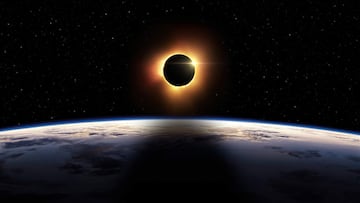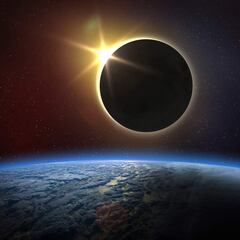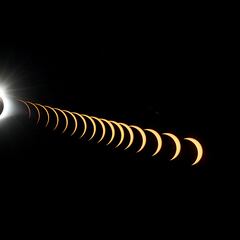Why will they lock down prisons in New York during the solar eclipse of April 8?
A group of New York inmates is suing the corrections department to be allowed to observe the solar eclipse saying their religious rights are being violated.

All across the United States, Americans are getting ready for the solar eclipse that will sweep across the nation on Monday 8 April. Roughly 31.6 million live within the path of totality, where the sun will be completely blotted out, which will run from Texas through to New England.
For nearly every other American, 99 percent according to NASA, they will be able to view the solar eclipse in some form if the skies are clear. However, one group, even if the conditions are right may be denied the opportunity to witness the celestial event.
Why will they lock down prisons in New York during the solar eclipse of April 8?
Citing safety concerns for staff and inmates, the New York State Department of Corrections and Community Supervision (DOCCS) announced a lockdown for prisons from 2 to 5 pm during the solar eclipse. Prisoners will be given solar eclipse safety glasses to view the event from assigned work locations or housing units according to a DOCCS spokesperson but not from the yard.
The decision to implement a lockdown came less than a week after Jeremy Zielinski, an inmate at the Woodbourne Correctional Facility, was granted his request to view the celestial event on religious grounds. He, along with five other inmates, filed a class-action lawsuit asking to be allowed to observe the solar eclipse because it is “a rare, natural phenomenon with great religious significance to many.”
You may also be interested in: 2024 total solar eclipse set to be better than the one in 2017
Not in the path of totality for the total solar #eclipse? On April 8, we'll bring totality to you by broadcasting from several locations along its trajectory, including @NASAGlenn—our only center in the eclipse’s path.
— NASA (@NASA) April 2, 2024
How to watch: https://t.co/H2JIZV3JH7 pic.twitter.com/71zcBAlYeZ
Why the inmates suing New York prison system say they should be allowed to see the solar eclipse
The six plaintiffs come from different religious faiths, including an atheist, two Christians (a Baptist, a Seventh-Day Adventist), a Muslim and two Santeríans, and they argue that the celestial even has “great religious significance.” Zielinski, who is an atheist and the lead plaintiff, “firmly believes that observing the solar eclipse with people of different faiths is crucial to practicing his own faith,” according to the complaint.
“Because it is a central aspect of atheism to celebrate common humanity and bring people together to encourage people to find common ground.”
Related stories
Josh McDaniel, director of the Religious Freedom Clinic at Harvard Law School, told the Washington Post that there is “very robust protection” under federal law for religious freedom in prisons. He said that plaintiffs’ claim in their complaint that it is “a sincerely held religious belief that April’s solar eclipse is a religious event that they must witness and reflect on to observe their faiths,” could have merit.
“The plaintiff just needs to show that this is a sincere religious belief,” McDaniel said. “The fact that you have multiple plaintiffs from multiple different religious traditions lends credence to the sincerity.”



Complete your personal details to comment